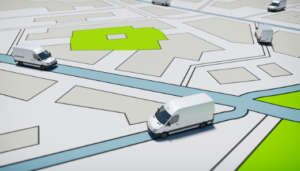Table of Contents
Optimising business operations is crucial for maintaining a competitive edge. Global Positioning System (GPS) tracking systems have shown significant potential for cost reduction and overall business performance enhancement among the various technologies available.
These tracking systems provide real-time data on many variables that can be analysed to reduce inefficiencies, thereby slashing operational costs and increasing profit margins. These savings can be crucial, especially as your business grapples with rising tariffs over their energy use.
These devices are more multi-faceted than many entrepreneurs, too, might give them credit for. Still, that works to your advantage. Being ahead of the curve is a position every firm wants to be in, and yours can be just that with state-of-the-art GPS tracking systems.
If you’re running a business yourself, now is the time to explore the potential on offer here. So, without further adieu, here are all the ways you can harness GPS tracking systems to lower business costs.
Improving Security

Another cost-saving aspect of GPS vehicle tracking systems is their role in enhancing safety and reducing theft-related losses. By monitoring driver behaviour, your business can encourage safer driving practices, reducing the risk of accidents and subsequent insurance costs.
Real-time tracking can also aid in quickly recovering stolen vehicles, minimising potential losses. Typically, it’s the insurance-approved GPS tracker that has these capabilities.
Like the ones outlined by Rewire Security, the Thatcham GPS tracker has features like instant alerts for unexpected vehicle movements or when a vehicle leaves a predefined area, further increasing the security of valuable business assets. By reducing the risk of theft and enhancing safety, GPS tracking systems can significantly lower insurance premiums, representing another avenue for cost reduction. You can visit rewiresecurity.co.uk for more information today.
If anyone, be it an employee or otherwise, does steal your vehicle, the GPS tracker can immediately notify the authorities. As we already mentioned, the device presents real-time location data, so these situations should be promptly resolved.
Reducing Fuel and Maintenance Costs
GPS tracking systems have been instrumental in streamlining fleet management operations, one of the most significant of which is the reduction of fuel and maintenance costs. By continuously monitoring vehicle routes, idling times, driver behaviour, and fuel consumption, these systems allow for the identification and elimination of costly inefficiencies.
Detailed real-time tracking means your business can optimise route planning, ensuring vehicles take the most efficient paths to their destinations, thereby saving fuel. Additionally, insights on driver behaviour can help to minimise aggressive driving habits such as harsh braking and acceleration, which lead to excessive fuel consumption and increased wear and tear on vehicles.
Of course, UK fuel prices have been chaotic in recent times. Some businesses were looking to switch to electric with their fleets, but those costs are too unfeasible in today’s climate, too, for many. So, being more conservative with fuel usage is in your firm’s best interests, and GPS tracking systems can help you and your drivers be more capable of that.
By addressing these aspects, your business can significantly reduce its fuel and maintenance expenses, which are often major cost components in industries such as logistics and delivery services.
Upholding Environmental Responsibilities
If GPS tracking systems can monitor and reduce fuel consumption, they can also help your business reduce its environmental impact. There’s a global conversation around going green today, so the more your firm contributes to it, the better.
GPS trackers can optimise routes and reduce unnecessary idling, lowering overall fuel consumption and carbon emissions. This green approach to operations can help meet regulatory requirements and build a positive company image, attracting environmentally-conscious consumers and partners.
Moreover, a company’s sustainability efforts can lead to financial incentives such as tax breaks or grants from government bodies, adding to the cost-effectiveness of these systems. Adopting sustainable practices through GPS tracking technologies is a strategic move combining environmental responsibility with cost-saving benefits.
Increasing Operational Efficiency

Implementing a GPS tracking system within a business isn’t only about reducing costs but also about increasing productivity. The system’s ability to provide real-time data and comprehensive reports can be leveraged to enhance scheduling and dispatching processes and improve staff accountability.
GPS tracking allows for more precise scheduling, as your company can use real-time traffic data to avoid delays and reduce downtime. It also aids in timely dispatching, ensuring the closest vehicle to a job site is sent, reducing travel time and enhancing customer service.
GPS tracking systems also significantly improve customer service and client retention – an important aspect in reducing business costs. With real-time tracking, your business can provide customers with accurate delivery or arrival times, minimising waiting times and enhancing the overall customer experience.
The predictive capabilities of GPS tracking systems also enable companies to address potential service issues proactively. For instance, if a delay is anticipated, your business can promptly notify customers, improving transparency and building trust.
Furthermore, companies can use geofencing technology to send automated notifications when a delivery vehicle enters a predefined zone near the customer’s location. By enhancing customer service in this manner, your business can foster loyalty and reduce the costs associated with acquiring new customers.
Utilising Historical Data

GPS tracking systems generate vast amounts of data that can be analysed to gain insights into business operations, facilitating data-driven decision-making. Still, this information doesn’t need to be a flash in the pan, as it can have long-term uses.
The historical data accumulated by these systems can be used to identify trends and forecast future needs, helping to plan for optimal resource allocation. For example, your business can anticipate peak periods and arrange for additional resources in advance, thus avoiding last-minute expenses. In this way, GPS tracking systems empower your business to be proactive rather than reactive, reducing costs and fostering growth.
An insurance tracker often provides detailed reporting capabilities, meaning your business can access a range of data visualisation tools that aid in understanding and interpreting data, helping to take the right decisions at the right time. Ultimately, data-driven decision-making can lead to substantial cost savings by enhancing efficiency and eliminating waste in business operations.
Reducing Administrative Burdens
The power of GPS tracking systems also extends to administrative processes. Traditional methods of managing fleets and personnel involve tedious paperwork, manual logging of hours, and physical supervision. These consume considerable time and open up possibilities for human error.
GPS tracking systems automate many of these administrative tasks. They can accurately log driving hours, monitor overtime, and even integrate this data with payroll systems, making salary computations effortless and error-free. By streamlining these administrative procedures, your business can redirect resources to more critical operations, enhancing overall productivity and lowering operational costs.
Considering employees can waste a tremendous amount of time on ‘pointless tasks’ (most of which probably involve admin to some degree), GPS trackers with these capabilities can be a game changer. It may increase levels of worker satisfaction and thus also improve things like feelings of job satisfaction and employee retention.
Business Continuity and Disaster Management
If the last few years have taught you anything, it’s likely that your business must be prepared to deal with unexpected situations. GPS tracking systems can be integral to business continuity planning and disaster management.
In the event of a natural disaster or an unexpected event like road closures, real-time GPS data allows your business to re-route its fleet effectively, reducing downtime and maintaining service levels. Similarly, these systems can help track and safeguard assets during emergencies, contributing to quick recovery and lower replacement costs. Thus, GPS tracking systems support resilience in business operations, minimising potential losses and downtime costs.
Author Profile

- Blogger by Passion | Contributor to many Business Blogs in the United Kingdom | Fascinated to Write Blogs in Business & Startup Niches |
Latest entries
 BusinessJuly 4, 2025How To Build an Integrated Development Plan That Works?
BusinessJuly 4, 2025How To Build an Integrated Development Plan That Works? BusinessJuly 1, 2025Investing in Commercial Property: Key Considerations for Business Owners
BusinessJuly 1, 2025Investing in Commercial Property: Key Considerations for Business Owners Social MediaJuly 1, 2025TikTok AI Dance Revolution: Top Trends, Earnings & How to Go Viral
Social MediaJuly 1, 2025TikTok AI Dance Revolution: Top Trends, Earnings & How to Go Viral FinanceJune 14, 2025BlackRock: The World’s Most Powerful Asset Manager Explained
FinanceJune 14, 2025BlackRock: The World’s Most Powerful Asset Manager Explained




